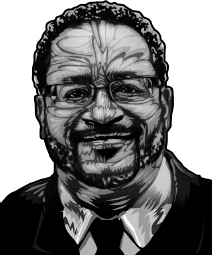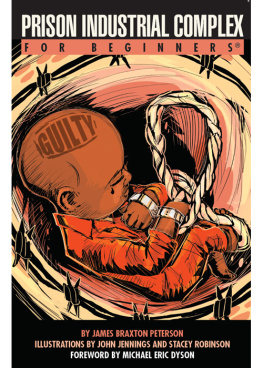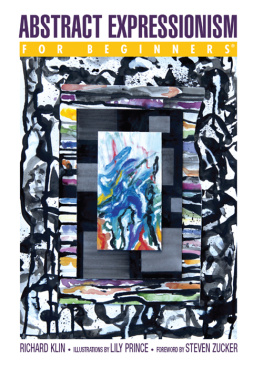Praise for
Prison Industrial Complex For Beginners
A truly indispensable book, especially for educators across the disciplines. One cannot understand America today without understanding the monstrosity that is the Prison Industrial Complex, and this slim volume helps readers not simply understand the PIC but feel righteous rage about it.
BAZ DREISINGER
Associate Professor of English, John Jay College of Criminal Justice; Founding Academic Director, Prison-to-College Pipeline; author, Incarceration Nations (2016)
In his penetrating Prison Industrial Complex For Beginners, Dr. Peterson shines a bright and relentless spotlight on the social catastrophe that is America's sprawling criminal justice system. As only an educator with a deep and personal knowledge of their subject material can, Peterson topples the myths and reveals the racist machinery that lies at the heart of that system. For too long, liberals and conservatives alike have labored under the delusion that the Prison Industrial Complexwhen they even acknowledge its existenceis merely an unfortunate accident of history. It's as if it were a sort of natural disaster that, despite our best intentions, we've wandered aimlessly into. In clear and persuasive writing, Dr. Peterson argues that the human-ravaging machinery of the carceral state is the result of deliberate and racist policy, developed and strengthened at every level of government. Prison Industrial Complex For Beginners is essential reading for anyone curious about the origins of the harrowing path we've walked and hungry for the sort of clarity needed to lead the way out.
GLENN E. MARTIN
JustLeadershipUSA
Dr. James Braxton Peterson's Prison Industrial Complex For Beginners seamlessly patches together the complex development of the PIC, which is an overwhelming social and political force with many complicated causes and contributors. As a roadmap for understanding the United States' path to becoming known as Incarceration Nation, the book tracks why and how the US chose the road for implementing increasingly harsh punitive responses to crime instead of the route of embracing social solutions to address crime. Peterson's analysis illustrates how racism drove the choice to create and sustain a PIC that uses prisons for punishment and oppression as opposed to rehabilitation or social justice. By identifying policies related to the war on drugs, solitary confinement, life sentences for juveniles, exploitative inmate labor, prison privatization, as well as political verbiage that refers to prisoners as animals, Peterson's work highlights the dehumanization of people who are incarcerated as a central theme of American correctional policy.
CAITLIN J. TAYLOR
Assistant Professor, Department of Sociology and Criminal Justice La Salle University
In a highly engaging and straightforward manner, James Peterson locates, narrates, and critiques the massive apparatus that is today's American carceral stateone that has contained more black bodies, and has ensnared more black lives, than at any other point in U.S. history. For scholars and lay readers alike, Peterson's book makes clear that our nation's staggering rate of incarceration is not rooted in a disinterested policy response to violence or crime, nor has it become just some rite of passage for black youth. In short, mass incarceration's origins are deeply rooted in our nation's racialized past and, as importantly, it is today but one part of a massive Prison Industrial Complex that serves very specific interests, devastates communities, and therefore must be dismantled.
HEATHER ANN THOMPSON
Historian, University of Michigan, and author, Blood in the Water: The Attica Uprising of 1971 and its Legacy (2016)

For Beginners LLC
155 Main Street, Suite 211
Danbury, CT 06810 USA
www.forbeginnersbooks.com
Text: 2016 James Braxton Peterson
Illustrations: 2016 John Jennings and Stacey Robinson
This book is sold subject to the condition that it shall not, by way of trade or otherwise, be lent, re-sold, hired out, or otherwise circulated without the publisher's prior consent in any form of binding or cover other than that in which it is published and without a similar condition being imposed on the subsequent purchaser.
All rights reserved. No part of this publication may be reproduced, stored in a retrieval system, or transmitted in any form or by any means, electronic, mechanical, photocopying, recording, or otherwise, without prior permission of the publisher.
A For Beginners Documentary Comic Book
Copyright 2016
Cataloging-in-Publication information is available from the Library of Congress.
ISBN-13 # 978-1-939994-31-8 Trade
Manufactured in the United States of America
For Beginners and Beginners Documentary Comic Books are published by For Beginners LLC.
First Edition
10 9 8 7 6 5 4 3 2 1
www.redwheelweiser.com
www.redwheelweiser.com/newsletter
Contents
Chapter 1
The Origin of Complexes
Chapter 2
Race and the Persistence of Law-and-Order Ideology
Chapter 3
The Failed War(s) on Drugs
Chapter 4
Private Profits and Private Prisons
Chapter 5
Youth, Immigration, and Solitary Confinement
Chapter 6
Recidivism and Real Reform
Epilogue
From The New Jim Crow to Jimmy's Back to The Last Jimmy
Appendix
The Black Prison Narratives Syllabus
Foreword
by Michael Eric Dyson

As a professor of English, James Braxton Peterson knows a thing or two about long, and wrong, sentences. Beyond his brilliant understanding of figures of speech, Peterson knows a great deal about the figures that simply don't add up to justice in the startling statistics of who gets locked up in modern America. And he knows about the human figuresblack, brown, and poorwho end up in prison because of their color and not just their character.
I have occasionally accompanied Peterson as he burrows beneath the dingy confinement of dangerous human flesh inside jails and prisons. He has often conducted what can only be called an ethnography of imprisonment by asking the incarcerated what they think and feel. I have seen him ask about their mental and physical health, and about their families, before he rages, quietly and with great intelligence, against the forces that got them incarcerated. In terms at once poetic and practical, he translates Michel Foucault's reflections on discipline and punishment, or rap legend Nas's epistle to an imprisoned comrade caught up in the brutal logic of the streets, while never failing to think with them about the choices they madechoices that, in part, made them.
Because I am a clergyman, I viewed what Peterson was doing as ministry, indeed the most sophisticated and substantive ministry one might imagine without the proselytizing that is often seen as an evangelist's most compelling mission. Of course it is more than a little ironic that Peterson hails professionally from Pennsylvania, where a couple of centuries back the Quakers urged offenders to search their consciences in solitary confinement to piece back together their criminally fractured livesa fateful trend that Peterson skillfully deconstructs in this book.
Peterson's mission in prison was different. He offered the victims of societal structures and behaviors an edifying twist on their destinies by urging them to become more conscious of what was being done to them, and what they were doing to themselves, in a society that cared little about the distinction and punished them all the same. Except it didn't punish them












